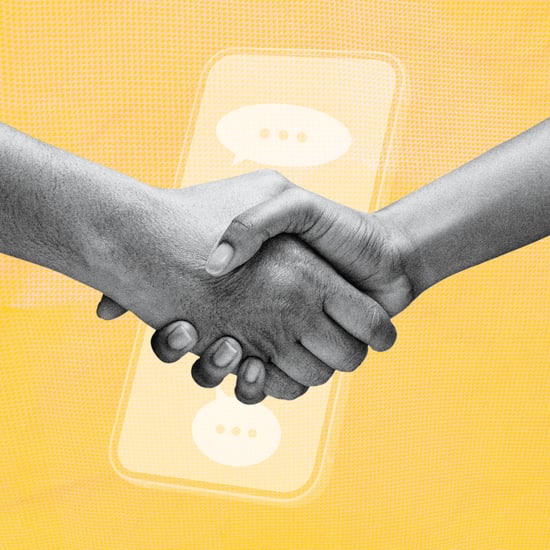How to Ask For an Open Relationship
How to Ask Your Partner For an Open Relationship, Because Staying Silent Won't Help

Monogamy is dead. Well, maybe for you it is. You're not alone, though. Plenty of people are in open relationships, with even more broaching the subject with their partners every day. In fact, one study found that one in five people reported engaging in a form of consensual nonmonogamy — an umbrella term for all kinds of nonmonogamous relationships — at some point in their life. If this sounds like it could be you but you're struggling to talk to your partner about starting an open relationship, here's what you need to know, according to sex experts.
Do Some Self-Reflecting First
If you're interested in having an open relationship, that desire is coming from somewhere. Before you bring up the topic with your partner, do some self-reflection to find out where exactly it's coming from. "I think you first have to understand why you want to be in an open relationship, and really, really explore it," Emily Morse, host of the longest-running sex and relationship podcast, Sex With Emily, told POPSUGAR.
Does your desire to have an open relationship stem from insecurity or fear? Does it come from a lack of understanding of what an open relationship is? Does it come from a genuine place of curiosity and self-expression? By being honest about the reasons you're interested in having an open relationship, you're giving yourself the space to process your desires, which will ultimately help you share them with your partner.
Knowing this information will make you more comfortable and confident and can also help you field questions from your partner. In the world of consensual nonmonogamy, there are many terms swirling around. "You have to define what it means because, for many people, an open relationship might mean swinging, or it might mean that you want to have other partners, and that this partner would now become your primary partner," Morse explained.
Not only is the term "open relationship" ambiguous, but it also can carry a preconceived notion with it. By being clear about what it means to you, you can push back against misplaced fears that your partner might have upon hearing you use the term. "You really have to get into discussing what it looks like," Morse said. "You have to have really clear boundaries, because your partner is going to have a lot of questions if they had never thought about it before. Your partner's going to be asking, 'What do you mean by that?' 'Does it mean that you don't love me, or you want to sleep with other people?' And so you want to be able to have that open conversation with them."
Be Mindful in Your Approach
For any big conversation with a partner, Morse said, you should remember the three Ts of communication: timing, turf, and tone. "You want to make sure that you're doing it at a good time when you've really thought about what you want to say," she explained. "You're not hungry, angry, lonely, or tired. You're relaxed. You're hanging out outside the bedroom. And your tone is really curious and open."
Tone is where people tend to go wrong when talking about open relationships with their partner for the first time. "There's a lot of people who go to their partner and say, 'You know, I've been thinking about this thing, and I'm really sorry, and I hope you don't hate me for this,'" Liz Powell, PsyD, a clinical psychologist and author of Building Open Relationships, told POPSUGAR. The problem is, "When you set that tone, your partner is going to react to that tone as well," they explained.
Remember that a nonmonogamous relationship isn't a punishment and doesn't have to be a negative thing. Framing it as a negative from the beginning is setting yourself up for failure and adding unnecessary stress on your partner as well. Instead, frame your conversation as exactly that: a conversation. "Let them know that this is something that you want to talk to them about and you look forward to hearing their perspective," Morse said.
"How can you present [nonmonogamy] to your partner in a way that doesn't negate that they aren't there yet, or that they haven't had the thought process, but that makes it less of a conversation about this terrible thing you're inflicting upon them and more about an opportunity for the two of you to examine?" Dr. Powell said. They suggest saying something like, "'Hey, I've been reading about this thing called nonmonogamy, and it seems really intriguing. Would you be open to reading some stuff about it with me?' Or, 'Have you ever thought about it?'"
Lay It All Out There
Though it's tempting to minimize what you want in this initial conversation, Dr. Powell said you should be upfront with what you're thinking. "What tends to happen is that a lot of folks, particularly if they're in a longer-term, monogamous, committed relationship, tend to approach this conversation trying to assuage a partner's fears as much as possible and ask for the smallest amount of change that they think will help them meet what they want or need, and it tends to lead to this stop-start, bumper cars unfolding over time," they explained.
It might feel like saying less will help ease your partner into a new relationship dynamic, but by withholding information about what you're imagining, you may leave them feeling blindsided down the line. "What often happens is . . . the person who wants to explore makes this initial very small ask, and then realize they want more, and they ask for more, and so for the person receiving that ask, it feels like the terms have changed," Dr. Powell said. By talking about your hopes for your open relationship in their full scope, you are giving your relationship a more solid foundation as it transitions.
Know That There Will Probably Be Multiple Conversations
As wonderful as it would be to have everything sorted out in one conversation, opening up a relationship will probably take many. But don't worry; that's a good thing. "It is really important for you to give yourself space for this to be a series of conversations about what things might be like with plenty of pauses between conversations for folks to process their own feelings and do their own thinking," Dr. Powell said.
By taking breaks in between conversations, you are taking the pressure off yourself and your partner to figure everything out in the moment. You are also giving yourselves more time to reflect and think about your feelings. You also have to remember that while being in an open relationship has been on your mind, it might not have been on your partner's. That means there is a gap in terms of how much time each of you has had to sit with the idea. Give them a second to catch up and process their thoughts by offering to have another conversation later.
Realistically, if you're hoping to enter into an open relationship, get ready to communicate a lot. "It's true that people in nonmonogamous relationships, really the people that I know that are very successful at it, are excellent communicators," Morse said. "They practice rigorous honesty. And they really kind of get off on talking about it."
The truth is that this first conversation is only the beginning, and communication is the most important tool in an open relationship. "Eventually, hopefully, you get to the place of compassion where you're actually feeling pleasure for your partner who's receiving pleasure and [from] the fact that your partner's getting pleasure and joy from somebody else," Morse said. "That's a journey that takes time, but it's possible."
Remember That Things Can Change
When talking to your partner about having an open relationship, remember that you're not working toward one fixed target. As you open up your relationship, you will learn new things about yourself, your partner, and your relationship, and the things you want may change. "We're bad at telling what we want, particularly when we don't have a lot of experience," Dr. Powell explained. "So if you're someone who has never done a form of nonmonogamy before, the things you think you might want when you're first looking at exploring may not be the same things you end up wanting after being in that world."
In relationships, we tend to have an idea that we're working toward one final goal, but Dr. Powell pushed back against this idea. "If you're in a previously monogamous relationship, recognize that as one or both of you explore nonmonogamy, it's not going to be a situation possibly ever where you find your final endpoint where nothing changes ever again," they said. This is important to know, because going in with an expectation that there's a final outcome of your relationship can lead to disappointment. In reality, all relationships go through changes and don't follow a linear path. By definition, nonmonogamous relationships go against our cultural mold, so give yourself grace to move past the outdated constraints that aren't serving you. This first conversation is a chance to carve your own path.







